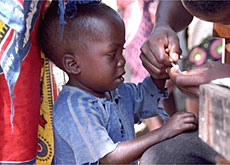Roche collaborates on new malaria drug

The Swiss pharmaceutical group, Roche, has joined forces with an Indian generic manufacturer to produce a new, cheaper anti-malarial treatment.
The novel partnership with New Delhi-based Ranbaxy Laboratories should ensure the rapid development of the synthetic drug.
Geneva-based Medicines for Malaria Venture (MMV) helped secure the unconventional partnership which could serve as a model for fighting diseases in developing countries.
“Ranbaxy will ensure cost-effective further development and delivery of this potential new anti-malaria medicine,” René Imhof, head of pharma research at Roche, told swissinfo.
The potential treatment is a synthetic copy of artemisinin. Artemisinin-based anti-malarials are now seen as the most effective medicines to treat drug-resistant malaria.
Natural remedy
Those artemisinin derivatives that are currently available use naturally grown artemisia annua – a plant used for centuries in China as a remedy against various forms of fever.
“The difference between a synthetic drug and a naturally produced drug in terms of cost is huge,” said Chris Hentschel, chief executive of MMV.
He said farmers were unlikely to be able to grow enough for any large-scale use of the drugs.
“On the other hand, with a natural synthetic compound that is not an issue and the bigger the scale, the cheaper it becomes.”
The new molecule is expected to cure malaria in three days.
Clinical tests
Although Roche shut down its tropical disease research programmes in 1999, MMV asked the company to continue supporting a synthetic artemisinin project at the University of Nebraska.
The team also included researchers from the Swiss Tropical Institute in Basel and Australia’s Monash University.
Roche agreed to take on the project on the understanding that they would help in the discovery but not the development phase.
After Roche helped to discover a promising molecule, MMV finally selected Ranbaxy to perform clinical tests.
Roche has now passed on the baton to India’s largest pharmaceutical company, paving the way for the drug’s further development.
“The original discovery work was done by the University of Nebraska and other academic partners. They invested the intellectual property rights with MMV which has now transferred some of those rights to Ranbaxy,” said Hentschel.
Resistance
Resistance to cheap and effective drugs poses one of the greatest threats to malaria control.
Most pharmaceutical companies have neglected malaria for the last 40 years because like other tropical diseases it offers little return on investment.
MMV was set up in 1999 and arranges public-private partnerships with the aim of producing a new anti-malarial drug every five years and making them available in poor countries.
In May 2001, Novartis agreed to supply its artemisinin-based drug Coartem to the World Health Organization at cost for distribution to developing countries.
Cost price works out at around $2.40 for a full adult treatment – far less than the same therapy in Switzerland (SFr63 or $45) where it goes under the brand name Riamet.
However, this is still too expensive for many developing countries where public health expenditure is less than $5 per person per year.
swissinfo, Vincent Landon
Over 300 million people suffer from malaria each year – well over one million of them die.
Sub-Saharan Africa bears 90 per cent of the burden. The majority of victims are children and pregnant women.
The World Health Organization says malaria kills 3,000 children under five years old every day.
It is Africa’s leading cause of under-five mortality and constitutes ten per cent of the continent’s overall disease burden.
Malaria costs Africa more than $12 billion (SFr15.6 billion) annually.

In compliance with the JTI standards
More: SWI swissinfo.ch certified by the Journalism Trust Initiative











You can find an overview of ongoing debates with our journalists here . Please join us!
If you want to start a conversation about a topic raised in this article or want to report factual errors, email us at english@swissinfo.ch.